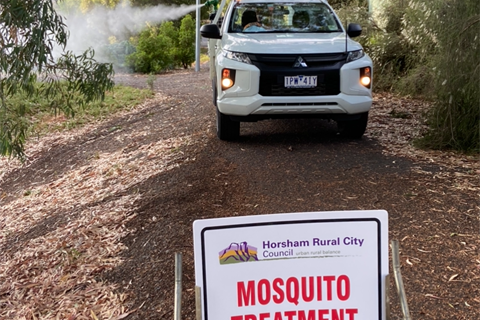Council
13 February, 2023
Alert as mozzie virus detected
Minimising mosquito numbers is more important now than ever following the detection of Murray Valley encephalitis in Horsham The mosquito-borne virus was found by routine surveillance towards the end of January and confirmed on January 31. Murray...

Minimising mosquito numbers is more important now than ever following the detection of Murray Valley encephalitis in Horsham
The mosquito-borne virus was found by routine surveillance towards the end of January and confirmed on January 31.
Murray Valley encephalitis is transmitted to humans by the bite of an adult mosquito and can seriously affect the health of a victim.
Horsham Rural City Council (HRCC) has appealed to residents to help control the mosquito population by eliminating potential breeding grounds.
"Regularly empty out stagnant water from containers,pet bowls, old tyres, bird baths and flowerpots,” HRCC environmental health co-ordinator Luke Mitton said.
No one has so far contracted the disease in Victoria.
The state's last known cases occurred in 1974 after significant flooding.
However, the risk remains real in the Wimmera as the mosquito season continues.
Although infections are often mild, in some instances the effects of Murray Valley encephalitisvirus can include fever, headache, nausea, vomiting and muscle aches.
In its most serious form, it can cause infection of the brain (encephalitis).
There is no vaccination against the Murray Valley encephalitis virus.
In response, on Friday HRCC announced it had intensified its mosquito control program after both Ross River virus and Murray Valley encephalitis were detected within its border.
Ross River virus was found in Horsham in early December.
Mr Mitton said council was part of the Victorian Government’s mosquito surveillance program in which traps were set in specific areas to test for insects carrying disease.
“Mosquitoes that are trapped are sent to Melbourne for identification and testing for disease," Mr Mitton said.
"The surveillance program provides early detection for potential mosquito-borne disease.
“Since last October we have also conducted larval mosquito treatment in high-traffic locations around the municipality and also treated mosquito larvae in stagnant water sources."
Mr Mitton said treating larvae to prevent them developing into adults was the most effective approach.
“Since the viruses were found to be present, adult fogging and spraying is also now occurring in areas where mosquitoes congregate – usually areas with lots of foliage," he said.
"Council is also targeting areas where public events are to be held to temporarily reduce the number of adult mosquitoes."
Mr Mitton said using insect repellent, wearing long-sleeved loose-fitting clothing, staying indoors at dawn and dusk and using mosquito coils around the house could help to protect against being bitten.
The use of barriers such as nets and screens can also reduce mosquito bites.